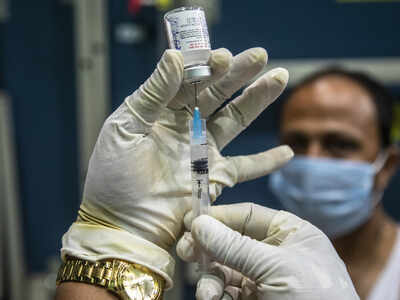Top Searches
- News
- India News
- ‘Escape variants infecting doctors post vaccination’
‘Escape variants infecting doctors post vaccination’

NEW DELHI: Most doctors who have breakthrough infections after vaccinations tend to have some kind of escape variant or the other, not the normal strain, said Dr Anurag Agarwal, director, Institute of Genomics and Integrated Biology, underlining that it was a good sign of the quality of the vaccination programme as most of them had mild illnesses.
Experts also said that while the double mutant was detected in Maharashtra, it was not the only variant in the country. It was not found in some parts of the country, like Kerala and Punjab.
Amid concerns that the current surge in Covid-19 infections could be because of the double mutant, Dr Agarwal said, “First such sequence was part of the database pack in October. But in October, with declining cases, there was no knowledge about this particular mutation being important. The outbreak started in December-January in Kerala and Maharashtra. We gave importance to these states and started looking for mutations in these areas. Kerala had the most severe outbreak at that time. This mutation was absolutely not seen in Kerala. So, it was not related to the clinical outbreaks over there.”
Dr Agarwal further said, “In Maharashtra, you will see the first report in India of sequences starting to show this came from BJMC Hospital and a few samples were sequenced. But those were not representative. Around the same time, this mutation turned out to be important with papers coming out from California. They tied it with outbreaks. At that point, you have an outbreak. You have mutations available in sequences. And, you have reason to correlate together. We are making the same judgment today. Today, we can see many doctors are having breakthroughs. We are correlating that.”
He also said that since double mutants were sequenced from positive samples, it was not possible that they were not detected through RT-PCR.
If people with symptoms went for RT-PCR tests late, after seven-eight days when symptoms become severe, then there was a possibility of the test report coming negative, another expert said.
“The emergence of a new mutant is a long procedure,” Dr Saumitra Das of IISC, Bengaluru, said.
Experts also said that while the double mutant was detected in Maharashtra, it was not the only variant in the country. It was not found in some parts of the country, like Kerala and Punjab.
Amid concerns that the current surge in Covid-19 infections could be because of the double mutant, Dr Agarwal said, “First such sequence was part of the database pack in October. But in October, with declining cases, there was no knowledge about this particular mutation being important. The outbreak started in December-January in Kerala and Maharashtra. We gave importance to these states and started looking for mutations in these areas. Kerala had the most severe outbreak at that time. This mutation was absolutely not seen in Kerala. So, it was not related to the clinical outbreaks over there.”
Dr Agarwal further said, “In Maharashtra, you will see the first report in India of sequences starting to show this came from BJMC Hospital and a few samples were sequenced. But those were not representative. Around the same time, this mutation turned out to be important with papers coming out from California. They tied it with outbreaks. At that point, you have an outbreak. You have mutations available in sequences. And, you have reason to correlate together. We are making the same judgment today. Today, we can see many doctors are having breakthroughs. We are correlating that.”
He also said that since double mutants were sequenced from positive samples, it was not possible that they were not detected through RT-PCR.
If people with symptoms went for RT-PCR tests late, after seven-eight days when symptoms become severe, then there was a possibility of the test report coming negative, another expert said.
“The emergence of a new mutant is a long procedure,” Dr Saumitra Das of IISC, Bengaluru, said.
FacebookTwitterLinkedinEMail
end of article
Trending Topics
Top Stories Right Now
- indiaCovid-19: Fresh infections at 3.46 lakh, most active cases in Bengaluru
- india60% of Indian variant samples tested in labs found in Maharshtra
- indiaCovid live: 3 lakh Remdesivir vials a day to be produced soon
- india‘We, as a collegium, failed to appoint women judges to SC’: CJI Sharad Bobde
- india80cr to get 5kg of free grain under NFSA for next 2 months
Quick Links
Coronavirus in MumbaiFarm bill 2020Farmers protestCoronavirus in DelhiCoronavirus in BangaloreCoronavirus symptomsCoronavirus in IndiaWest Bengal elections 2021Coronavirus NewsSolar EclipseNPRWhat is NRCCAB BillCAB and NRCAssam election 2021Podcast newsLok SabhaTamil Nadu Election 2021CongressBJP newsKerala Elections 2021Indian ArmyISRO newsSupreme Court